 Last night was very clear. A good moment to capture the M42. This birthplace for stars can be found in the constelation of Orion. From my observatory, the nebulae bearly rises above the tree tops. So its a matter of good timing to get a good shot. In this picture I used 40 frames of 30 seconds each. The camera was set to ISO 1600. I used Deepskystacker to stack the frames, and used Photoshop and Nebulosity to finalse it.
Last night was very clear. A good moment to capture the M42. This birthplace for stars can be found in the constelation of Orion. From my observatory, the nebulae bearly rises above the tree tops. So its a matter of good timing to get a good shot. In this picture I used 40 frames of 30 seconds each. The camera was set to ISO 1600. I used Deepskystacker to stack the frames, and used Photoshop and Nebulosity to finalse it.
Thursday, December 13, 2007
The Orion nebulae
 Last night was very clear. A good moment to capture the M42. This birthplace for stars can be found in the constelation of Orion. From my observatory, the nebulae bearly rises above the tree tops. So its a matter of good timing to get a good shot. In this picture I used 40 frames of 30 seconds each. The camera was set to ISO 1600. I used Deepskystacker to stack the frames, and used Photoshop and Nebulosity to finalse it.
Last night was very clear. A good moment to capture the M42. This birthplace for stars can be found in the constelation of Orion. From my observatory, the nebulae bearly rises above the tree tops. So its a matter of good timing to get a good shot. In this picture I used 40 frames of 30 seconds each. The camera was set to ISO 1600. I used Deepskystacker to stack the frames, and used Photoshop and Nebulosity to finalse it.
Sunday, December 02, 2007
NGC891
Expanding comet Holmes
Tuesday, October 30, 2007
Erupting comet Holmes
Comet Holmes, normaly an object unvisible to the nacked eye, erupted this week. These photo's where taken today. The white center of the picture reveals the dust tail of the comet. The green halo is the gas tail. Because the sun is "behind" the observer, dust and gastail are in line. Thats why this comet lookes so odd. The picture with the halo consists of 100 frames 0f 30 seconds each on ISO 1600. The dust tail picture is made of 20 frames of 15 seconds each on ISO 800. It was hard to capture the core of the comet. It was easely overexposed! Eager to find the comet yourself?
Data for 30-10-2007:
Comet '17P' Magnitude= 2.9. Best seen from 17.7h - 6.8h. RA= 3h47m26 Dec=+50°29.0' (J2000) Distance to Sun= 2.46AU Distance to Earth= 1.62AU Elongation=139° hourly motion: dRA=-24.9"/h dDec= 6.5"/h.
Or see the finderchart.
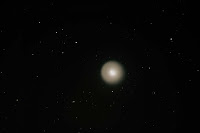

Data for 30-10-2007:
Comet '17P' Magnitude= 2.9. Best seen from 17.7h - 6.8h. RA= 3h47m26 Dec=+50°29.0' (J2000) Distance to Sun= 2.46AU Distance to Earth= 1.62AU Elongation=139° hourly motion: dRA=-24.9"/h dDec= 6.5"/h.
Or see the finderchart.


Sunday, October 28, 2007
More colour in the pictures
Friday, October 05, 2007
Longer exposure
Friday, September 07, 2007
New photo enhancement techniques
Monday, August 13, 2007
The moon is getting sharper
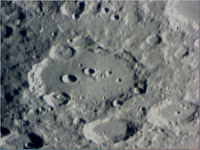
 These two pictures are taken on august the 5th. In the early morning hours the sky was very clear and there wasn't much seeing. And als the collimation of the scope wasn't that bad. So the circumstances were good to make sharp pictures. These photo's of the moon (last quarter) are the sharpest yet. For the photo of the crater Copernicus, I used 3 frames that are combined in photoshop.
These two pictures are taken on august the 5th. In the early morning hours the sky was very clear and there wasn't much seeing. And als the collimation of the scope wasn't that bad. So the circumstances were good to make sharp pictures. These photo's of the moon (last quarter) are the sharpest yet. For the photo of the crater Copernicus, I used 3 frames that are combined in photoshop.
Sunday, July 29, 2007
Monday, July 02, 2007
New template for photo's
Saturday, June 23, 2007
The dark side of the moon
Thin moon cresent
Sunday, June 03, 2007
M51: Resampled
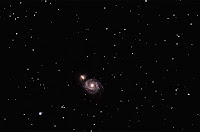 While testing my new laptop I resampled my picture of M51 (Canes Venatici). I also detected that two other little galaxy's are visible: IC 4263 (Mvis 15,7) and NGC 5169 (Mvis 14.4). These galaxy's are found at the right hand corner, below the middle. Can you find them? Never before I photographed objects this dimm.
While testing my new laptop I resampled my picture of M51 (Canes Venatici). I also detected that two other little galaxy's are visible: IC 4263 (Mvis 15,7) and NGC 5169 (Mvis 14.4). These galaxy's are found at the right hand corner, below the middle. Can you find them? Never before I photographed objects this dimm.The tests revealed that Microsoft Vista causes a lot of driver problems. I need to solve them before my holiday in Southern France. I take the telescope, the camera an the laptop along. Time is ticking.....
Saturday, May 26, 2007
Saturn occulation by the moon
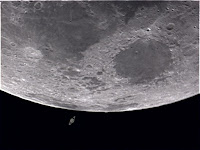
On 22th of may this year the moon and saturn had a close encounter. Unfortunally I was unable to photograph the point when saturn became visible again. A band of clouds blocked my view. But a couple of minutes later I took this photo. There is a lot of differance in luminosity between the moon and saturn so that had to bee corrected.
M81 and M82 in Ursa Majoris
M97 in Ursa Majoris
Sunday, May 13, 2007
Latest Deepsky result...
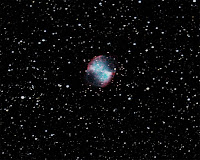 Last night we had very clear skies. I went outside at 12 at night, and went to bed at 3:30. But with some result! This is my photo of M27 "the dumbell nebula". I took 20 frames, 1600 ISO, 30 seconds each (10 minutes in total). These frames where stacked with Deepskystacker. In Photoshop the photo was adjusted with curves and contrast/luminosity. It is totaly amasing to get so much detail!. Als the number of stars is fantastic. This is also due to the proximity of the milky way (our own galaxy). I also made an enlargement to show the finer detail inside the nebula. And I also enhanced the colours. I found out that the canon 350D is a little insensetive to red :-(
Last night we had very clear skies. I went outside at 12 at night, and went to bed at 3:30. But with some result! This is my photo of M27 "the dumbell nebula". I took 20 frames, 1600 ISO, 30 seconds each (10 minutes in total). These frames where stacked with Deepskystacker. In Photoshop the photo was adjusted with curves and contrast/luminosity. It is totaly amasing to get so much detail!. Als the number of stars is fantastic. This is also due to the proximity of the milky way (our own galaxy). I also made an enlargement to show the finer detail inside the nebula. And I also enhanced the colours. I found out that the canon 350D is a little insensetive to red :-(Wednesday, May 02, 2007
M57 in Lyra
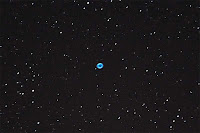 This a photo of M57 in detail. Als this photo is touched-up a little with Photoshop. Also the central star, wich exploded and caused this ring of gas, is visible. Look in the centre of the nebulae. Unfortunaly my Canon doesn't record red so well. Otherwise the red outer rimm of the nebulae would be visible also.
This a photo of M57 in detail. Als this photo is touched-up a little with Photoshop. Also the central star, wich exploded and caused this ring of gas, is visible. Look in the centre of the nebulae. Unfortunaly my Canon doesn't record red so well. Otherwise the red outer rimm of the nebulae would be visible also.Tuesday, April 24, 2007
Moon and airplane
M13 - Globular cluster in Hercules
 This week finaly clear skies again. I had a shot at M13. This is a globular cluster that belongs to our own galaxy. In total I took twenty photo's with an exposion of 1 minute on 800 ASA. These photo's where stacked with DeepSkyStacker. In this case you get a photo with a total exposure time of 20 minutes. After that a little touch-up in Photoshop. For those of you who realy pay attention: In the upper left corner NGC 6207 is also visible. This galaxy has an apparent magnitude of 12,1!
This week finaly clear skies again. I had a shot at M13. This is a globular cluster that belongs to our own galaxy. In total I took twenty photo's with an exposion of 1 minute on 800 ASA. These photo's where stacked with DeepSkyStacker. In this case you get a photo with a total exposure time of 20 minutes. After that a little touch-up in Photoshop. For those of you who realy pay attention: In the upper left corner NGC 6207 is also visible. This galaxy has an apparent magnitude of 12,1!
Monday, April 23, 2007
Saturn
 This is my latest attempt to photograph Saturn. Yesterday we had clear sky's and de seeing was good. Technical data:
This is my latest attempt to photograph Saturn. Yesterday we had clear sky's and de seeing was good. Technical data: Philips Vesta Pro on a 200 mm F5 Newton
Barlow (3x) and a IR/UV blocking filter600 images (590 used) stacked witch RegiStax
This is a course result. It still needs some photoshopping ;-)
I'm pleased with the result
Friday, April 20, 2007
M51 - second attempt
Monday, April 16, 2007
Deepsky
A couple of day's ago I started with deepsky photography. I made photo's with the camera piggyback on the telescope (see the post down below). Finaly I managed to connect my Canon 350D on to the telescope. Last night was a very clear night. Ideal to shoot some pictures. It took me almost 4 hours to take the pictures. I needed a lot of time to prepare the telescope. :-)
For all pictures I used a camera sensetivity of 1600 ASA. I shot 10 pictures with a shutterspeed of 30 seconds (total exposure time 5 minutes). The seperate pictures where combined to one with DeepSkyStacker. For the final touch-up I used Photoshop. See my results in the enclosed pictures (click on one of the pictures to see the enlargement):
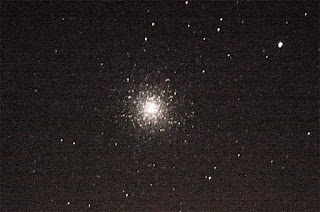



For all pictures I used a camera sensetivity of 1600 ASA. I shot 10 pictures with a shutterspeed of 30 seconds (total exposure time 5 minutes). The seperate pictures where combined to one with DeepSkyStacker. For the final touch-up I used Photoshop. See my results in the enclosed pictures (click on one of the pictures to see the enlargement):





Friday, March 23, 2007
New Camera

Tuesday, March 20, 2007
Using the new camera
Thursday, March 01, 2007
Finally The sun
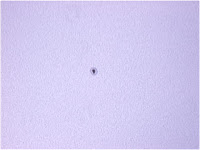 It doesn't look like much but this is my first picture of the sun. Right in the middle is sunspot 944. I used a "solar-screen" sun filter. And the webcam was used to take the picture. 266 images stacked. The next couple of years we go to a solar maximum. That means a lot of sunspots. And hopefully also bigger ones ;-).
It doesn't look like much but this is my first picture of the sun. Right in the middle is sunspot 944. I used a "solar-screen" sun filter. And the webcam was used to take the picture. 266 images stacked. The next couple of years we go to a solar maximum. That means a lot of sunspots. And hopefully also bigger ones ;-).
Wednesday, February 28, 2007
Focusser "Chris-style........
Monday, February 12, 2007
Saturn with filter
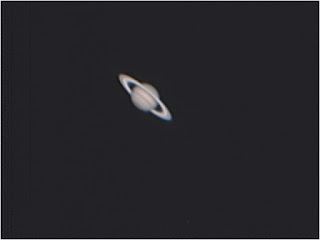 Getting a step closer again!!! This week I bought a Baader UV/IR filter. This filter blocks infra-red and ultra-violet light. This light tends to blur the image. In the enclosed picture you can see the results. The sharpest image up to now! Although the seeing was poor! There is a slight colour abberation. I suspect that this is due to bad collimation. I try to fix that later on.
Getting a step closer again!!! This week I bought a Baader UV/IR filter. This filter blocks infra-red and ultra-violet light. This light tends to blur the image. In the enclosed picture you can see the results. The sharpest image up to now! Although the seeing was poor! There is a slight colour abberation. I suspect that this is due to bad collimation. I try to fix that later on.Click on the image to see it in its original size!
Thursday, February 08, 2007
The moons of Saturn
Saturn RGB
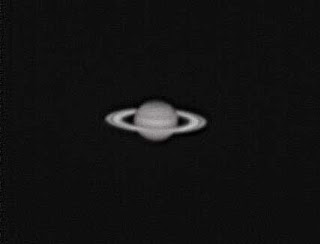 After re-programming my webcam, i could use it to make RAW images. Altough they are in black and white, they are a lot sharper. All I need is a technique to proces the RGB greyscale images into a color image. But for the time being I very happy with the results up to now. If anyone has tips and / or tricks, please let me know.
After re-programming my webcam, i could use it to make RAW images. Altough they are in black and white, they are a lot sharper. All I need is a technique to proces the RGB greyscale images into a color image. But for the time being I very happy with the results up to now. If anyone has tips and / or tricks, please let me know.
Monday, February 05, 2007
Saturn in greater detail
 Behold.... my finest result until now! It took me a while but i'm very pleased with this result. This photo is taken with a Philips Vesta webcam. I stacked 200 frames into this picture. The exposure time was 1/25 sec. per frame. To take a step further i will need a UV/IR filter. This will give a sharper image. So, another item on my next wish list...... ;-)
Behold.... my finest result until now! It took me a while but i'm very pleased with this result. This photo is taken with a Philips Vesta webcam. I stacked 200 frames into this picture. The exposure time was 1/25 sec. per frame. To take a step further i will need a UV/IR filter. This will give a sharper image. So, another item on my next wish list...... ;-)
Sunday, January 28, 2007
The moon (with high magnification)
Saturday, January 27, 2007
Saturn with barlowlens
 Well, here it is! Saturn! Fotographed with an 8 inch Newton telescope and a 3x barlow lens. I know I'm not there yet but I'm getting there.
Well, here it is! Saturn! Fotographed with an 8 inch Newton telescope and a 3x barlow lens. I know I'm not there yet but I'm getting there.I used 300 frames, stacked with RegiStax 4.0. Furthermore I used Photoshop to sharpen en colour the photo (perhaps I overdone it a little).
The seeing at the time of the photo was poor. Also Saturn stood only 20 degrees above the horizon. I'm sure the photo's will get better under better conditions.
Saturday, January 13, 2007
Using Neximage in primary focus
Subscribe to:
Comments (Atom)





















